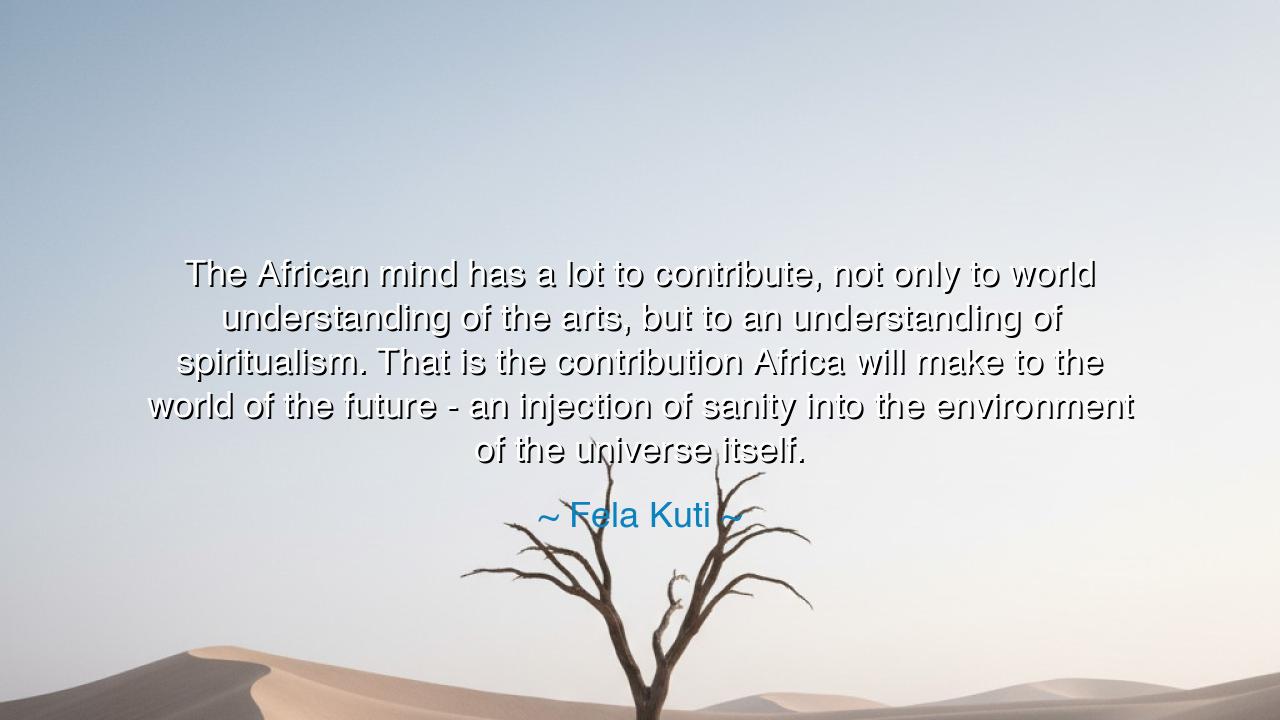
The African mind has a lot to contribute, not only to world
The African mind has a lot to contribute, not only to world understanding of the arts, but to an understanding of spiritualism. That is the contribution Africa will make to the world of the future - an injection of sanity into the environment of the universe itself.






The visionary Fela Kuti, prophet of rhythm and warrior of truth, once declared: “The African mind has a lot to contribute, not only to world understanding of the arts, but to an understanding of spiritualism. That is the contribution Africa will make to the world of the future — an injection of sanity into the environment of the universe itself.” These are not merely the words of a musician, but the proclamation of a seer — one who saw through the noise of modern civilization and beheld a deeper harmony, a rhythm that binds all creation together. Fela spoke not as a man of entertainment, but as a messenger of restoration, calling upon his people and all of humanity to remember the sacred wisdom buried beneath centuries of conquest, corruption, and confusion.
In the manner of the ancients, let us unearth the spirit behind his words. When Fela Kuti speaks of the “African mind,” he does not refer to geography or race alone, but to a consciousness — a way of being in tune with the living universe. The African mind, as he understood it, is not divorced from nature or spirit; it is grounded in rhythm, in community, in reverence for the unseen. In Africa’s ancestral traditions, art and spirituality are not separate pursuits but one and the same. The drumbeat is prayer; the dance is healing; the song is history; the spirit is living in all things. Fela saw in this unity a medicine for the modern world — a world that had become fractured by greed, alienation, and the illusion of control. His vision was that Africa, long dismissed and exploited, would rise again not through domination, but through wisdom, offering the world what it had lost: its sanity.
The origin of this quote can be traced to Fela’s lifelong mission to awaken both his continent and the world. Through his revolutionary music — what he called Afrobeat — he blended jazz, traditional Yoruba rhythm, and political resistance into a single spiritual language. To him, art was not decoration but liberation. He saw how Western systems of power had stripped people of meaning, replacing spirituality with materialism, community with competition, and freedom with conformity. Fela believed that Africa’s spiritual consciousness — its understanding of balance between body, soul, and earth — could restore what modern civilization had forgotten. In his eyes, this was not a matter of pride, but of survival.
Consider the story of Sundiata Keita, the 13th-century founder of the Mali Empire. Though a warrior and ruler, he governed not through fear, but through a sacred understanding of harmony between the physical and the spiritual realms. Under his rule, Mali became a place of art, wisdom, and justice — a reflection of the African philosophy that life and spirit are one. This same essence lives in the works of the sculptors of Benin, the griots of Senegal, the healers of the Congo, and the poets of Ethiopia. In each, there is a deep awareness that art is the bridge to the divine, and that the spiritual cannot be divorced from the moral or the communal. Fela Kuti’s message, like theirs, was that the African worldview holds within it the seed of restoration for the weary modern soul.
There is profound spiritualism in what he calls “an injection of sanity.” Fela was not condemning science or progress, but the soullessness of progress without purpose. He saw the modern world racing forward with no wisdom to guide its motion — like a drumbeat without rhythm. The “sanity” Africa could offer, in his eyes, was the rediscovery of equilibrium: a world in which technology serves humanity rather than enslaves it, and where art, faith, and justice are once again intertwined. This was not nostalgia for the past, but prophecy for the future — a call for global awakening led by those who have kept their spirit intact despite the scars of history.
O children of the world, hear this wisdom: the future of humanity lies not in more machines, but in more meaning. Learn from Fela Kuti’s vision. Do not mistake noise for progress, or profit for peace. Return to the root of your being — to the rhythm that lives in your heart and the harmony that binds you to all living things. Whether you are African by birth or by spirit, the lesson is the same: reconnect with your source. Let your art heal, let your work uplift, let your soul guide your intellect. For when the human heart beats once more in rhythm with the earth, the universe itself becomes sane again.
And so, let this be the enduring lesson of Fela Kuti’s prophecy: that every culture, every nation, has its medicine to offer the world — and Africa’s gift is spiritual balance through art and truth. The world of the future will not be saved by weapons or wealth, but by wisdom. Let each of us, then, live as healers of the collective soul. Create with reverence. Speak with courage. Dance with awareness. For in these acts, we honor the legacy of the African mind — and fulfill its promise: to bring sanity, spirit, and song back to a universe that has forgotten how to listen.






AAdministratorAdministrator
Welcome, honored guests. Please leave a comment, we will respond soon